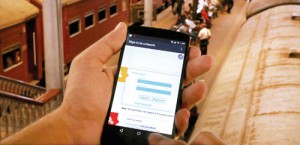ICTA steps into its next project, ‘ICT for Citizen Journalism’
Wi-Fi is predominantly used by the rich and wealthy in a country since the poor, who can’t afford it, don’t make use of it. When it comes to information and technology, it should not be limited to a certain category of people in society; it should be equally available to all citizens. The so called “free Wi-Fi” programme, which is commonly spoken about these days, is not actually “free Wi-Fi”, but was initiated as the “Internet Connectivity: A Citizen’s Right” project by the Information and Communication Technology Agency (ICTA) of Sri Lanka. However, with people now colloquially calling it “free Wi-Fi”, its product positioning has been jeopardised.

Muhunthan Canagey
These remarks were made by ICTA Managing Director/CEO Muhunthan Canagey, who spoke to the Business Times about this project last week.
He said, “People argued in the 1940’s when C.W.W Kannangara implemented free education. Because of free education, a lot of people were able to go to school. In today’s 21st century what about free Wi-Fi and free Internet, isn’t it the same? Is it only for the rich people who can afford to pay for it? People who do not use it and who don’t know anything about it, shouldn’t they also be given an opportunity to try?”
Adding to that, he mentioned that ICTA initiated the task of providing free Wi-Fi, which is in the 100-day manifesto of President Maithripala Sirisena. The intention of this is for the purpose of education, for easy access to government services, for citizens to engage in policy making and for, predominantly, the development of society. For the moment, 26 free Wi-Fi zones have been launched in several public locations island-wide, which will reach up to 300 by the end of April and 1,000 in 90 days. Also, each person can use up to 100MB. “We don’t intend to stop there, we will be increasing it to many locations and creating more connectivity. We are in an era where mobile operators provide only a limited coverage in certain areas,” said Mr. Canagey.
He also noted that the government should not be involved in setting up infrastructure, leaving it for the private sector to do so. The government must be the facilitator of growth and initiate things like this. “Not that we don’t have people, resources or technology, but it is about driving the vision. Sri Lanka needs to adapt to technology, otherwise we will be left behind. The mindset and perception of people has to change with new innovations and devices coming in. People think that if a mobile operator makes a pricing tariff change, that it is for the rich. But now what they

The ICTA-initiated "free Wi-Fi" public service was brought online at the beginning of this month. Pictured is a commuter attempting to login at the busy Fort Railway Station. Pic by M.A. Pushpa Kumara
have to understand with free Wi-Fi is that it is not only for the rich,” he said. Wi-Fi is the cheapest medium of transmission compared to 4G and all other networks. This is the first public and private participation between the local telcos and ICTA. The architectural design, negotiations and spearheading of the project was done by ICTA itself. Earlier, mobile operators were not allowed to set up outdoor Wi-Fi networks; it was only the fixed line operators who were allowed to do so. But now the licensing has been changed and all mobile operators are free to set-up Wi-Fi. “We have given the local mobile operators an opportunity to increase their business which has created more capacity with Wi-Fi locations being set up outdoors,” added Mr. Canagey.
Mr. Canagey also revealed that ICTA’s next initiative is “ICT for Citizen’s Journalism”. “The board approved the programme last week. For this programme, what we are planning to show people is that every person can become a journalist and contribute towards media organisations.
First, taking photographs and videos and sending it to a reporter which will enable him/her to have more information in order to analyse an incident further and report on it.
Second is as evidence in the judicial process, which ICTA will initiate next month. We are targeting about 100,000 people for this programme. Journalists will soon get information from different sources and from different angles,” stated Mr. Canagey.


